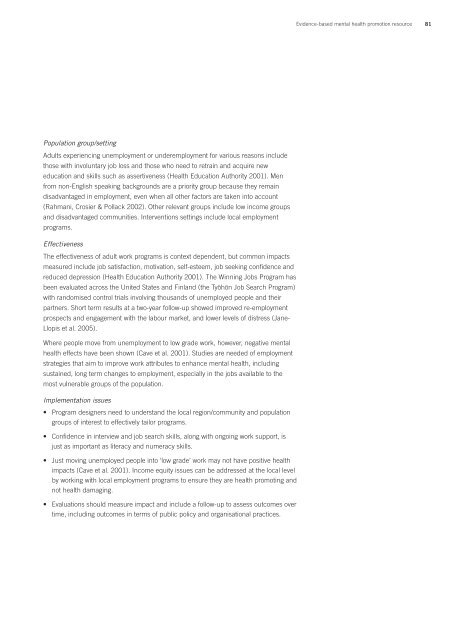Evidence-based mental health promotion resource - health.vic.gov.au
Evidence-based mental health promotion resource - health.vic.gov.au
Evidence-based mental health promotion resource - health.vic.gov.au
Create successful ePaper yourself
Turn your PDF publications into a flip-book with our unique Google optimized e-Paper software.
<strong>Evidence</strong>-<strong>based</strong> <strong>mental</strong> <strong>health</strong> <strong>promotion</strong> <strong>resource</strong>81Population group/settingAdults experiencing unemployment or underemployment for various reasons includethose with involuntary job loss and those who need to retrain and acquire neweducation and skills such as assertiveness (Health Education Authority 2001). Menfrom non-English speaking backgrounds are a priority group bec<strong>au</strong>se they remaindisadvantaged in employment, even when all other factors are taken into account(Rahmani, Crosier & Pollack 2002). Other relevant groups include low income groupsand disadvantaged communities. Interventions settings include local employmentprograms.EffectivenessThe effectiveness of adult work programs is context dependent, but common impactsmeasured include job satisfaction, motivation, self-esteem, job seeking confidence andreduced depression (Health Education Authority 2001). The Winning Jobs Program hasbeen evaluated across the United States and Finland (the Työhön Job Search Program)with randomised control trials involving thousands of unemployed people and theirpartners. Short term results at a two-year follow-up showed improved re-employmentprospects and engagement with the labour market, and lower levels of distress (Jane-Llopis et al. 2005).Where people move from unemployment to low grade work, however, negative <strong>mental</strong><strong>health</strong> effects have been shown (Cave et al. 2001). Studies are needed of employmentstrategies that aim to improve work attributes to enhance <strong>mental</strong> <strong>health</strong>, includingsustained, long term changes to employment, especially in the jobs available to themost vulnerable groups of the population.Implementation issues• Program designers need to understand the local region/community and populationgroups of interest to effectively tailor programs.• Confidence in interview and job search skills, along with ongoing work support, isjust as important as literacy and numeracy skills.• Just moving unemployed people into ‘low grade’ work may not have positive <strong>health</strong>impacts (Cave et al. 2001). Income equity issues can be addressed at the local levelby working with local employment programs to ensure they are <strong>health</strong> promoting andnot <strong>health</strong> damaging.• Evaluations should measure impact and include a follow-up to assess outcomes overtime, including outcomes in terms of public policy and organisational practices.



